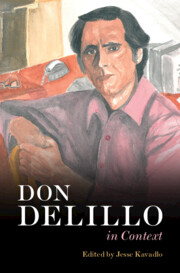Book contents
- Don DeLillo In Context
- Don DeLillo In Context
- Copyright page
- Contents
- Contributors
- Acknowledgments
- Abbreviations
- Introduction: Context, Content, Conflict
- Part I Places
- Part II History and Politics
- Part III Media and Pop Culture
- Part IV Literary Contexts
- Part V Material Contexts
- Part VI Social and Cultural Constructions
- Chapter 24 Religion and Spirituality
- Chapter 25 Race
- Chapter 26 Ethnicity
- Chapter 27 Gender
- Chapter 28 Time
- Part VII Writing and Writers
- Further Reading
- Index
- References
Chapter 27 - Gender
Masculine and Feminine Subjectivity
from Part VI - Social and Cultural Constructions
Published online by Cambridge University Press: 19 May 2022
- Don DeLillo In Context
- Don DeLillo In Context
- Copyright page
- Contents
- Contributors
- Acknowledgments
- Abbreviations
- Introduction: Context, Content, Conflict
- Part I Places
- Part II History and Politics
- Part III Media and Pop Culture
- Part IV Literary Contexts
- Part V Material Contexts
- Part VI Social and Cultural Constructions
- Chapter 24 Religion and Spirituality
- Chapter 25 Race
- Chapter 26 Ethnicity
- Chapter 27 Gender
- Chapter 28 Time
- Part VII Writing and Writers
- Further Reading
- Index
- References
Summary
A critical consensus has emerged that, rather than consolidating masculine power, DeLillo’s fiction unsettles it by exposing masculinity as a fragile social construct. Bearing in mind Philip Nel’s injection to consider DeLillo’s depiction of women as well as men, this chapter argues that DeLillo’s fiction not only undermines the central myths of white American manhood, but it also actively favours feminine forms of subjectivity and a feminine aesthetic. While DeLillo’s white men attempt to recover “true” selves that never existed, his women are fully aware of the ways in which the culture they inhabit both constructs and constitutes their subjectivity. More or less immune to the hankering for the real that haunts his men, DeLillo’s women, especially his women artists, tend instead to manipulate existing cultural codes in a fashion that permits them – paradoxically – some of the autonomy that his male characters seek. DeLillo’s recurrent engagement in his most recent fiction with the threat posed to women viewers of art demonstrates that his work remains committed to the scrutiny and critique of misogyny and masculinity in its most toxic manifestations.
- Type
- Chapter
- Information
- Don DeLillo In Context , pp. 260 - 269Publisher: Cambridge University PressPrint publication year: 2022



